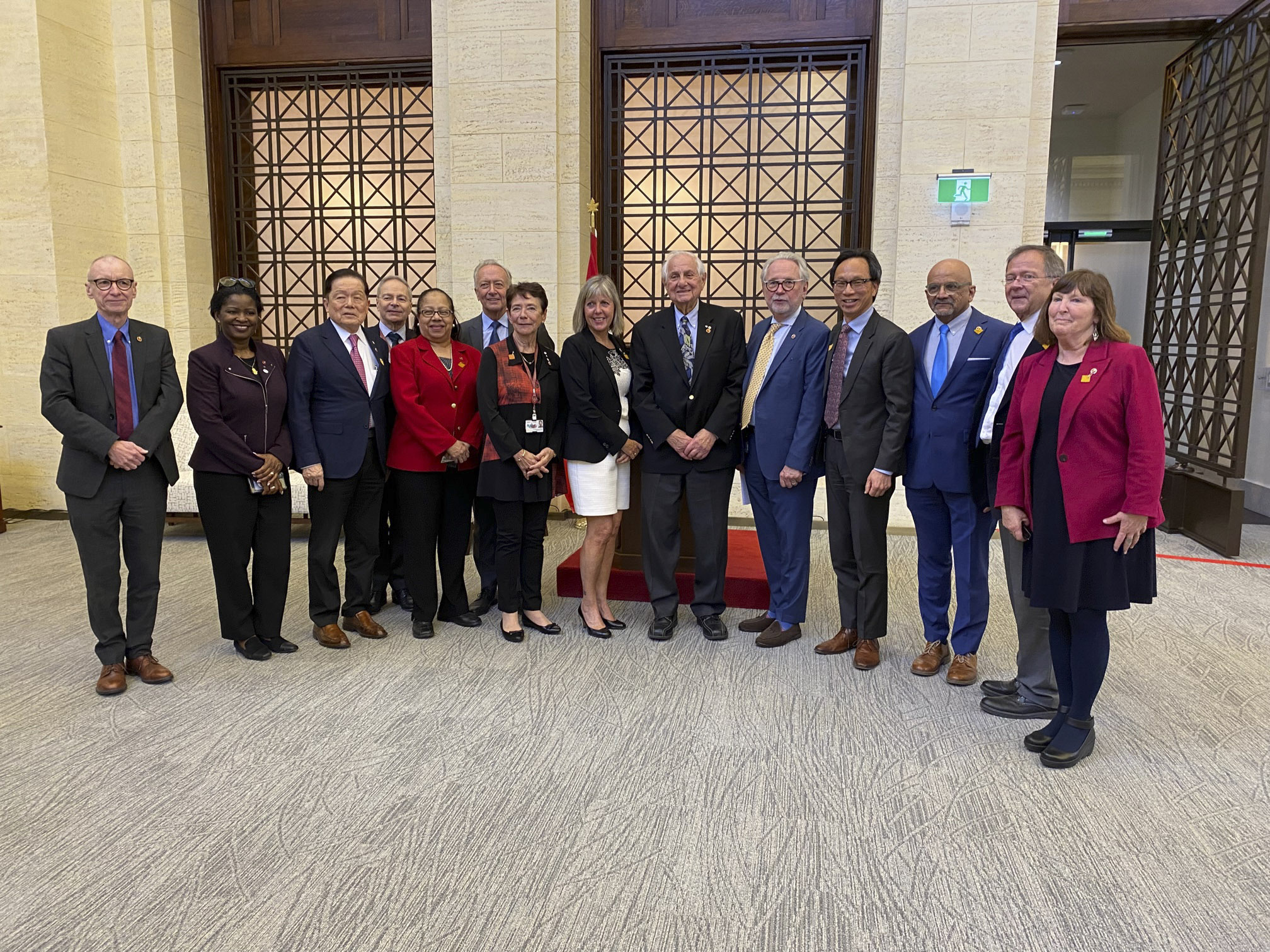
Conference
The New Senate
September 17, 2017
The Honorable Senator Paul J. Massicotte:
Honourable senators,
Senate Administration and political staff colleagues,
Ladies and gentlemen,
For many years now, modernizing the Senate has been one of the issues that concern me the most in my role as a senator. This is why I am particularly pleased to have this opportunity to present our ideas to you, whether or not you work on Parliament Hill, as individuals who share with us an interest and even, why not, some affection for our institution.
As discussed in the previous panel, the Senate has been both greatly commented on and greatly criticized in the news for the past couple of years. But what few people know is that for several years, a number of senators had actually grown increasingly frustrated with our direction and have been working to improve our effectiveness. We’ve reflected deeply on the root of these issues and have proactively taken action to implement change from within.
We had the sense that the Senate had not reached its full potential. Its partisan structure prevented us from credibly fulfilling our constitutional role of conducting legislative oversight and exercising sober second thought over bills. I am convinced that in order for Canadians to be confident that we are acting in the public interest, we must be able to study, analyze and vote free from ideologies, party pressure and political games. We must be above reproach, which means working more efficiently and more transparently.
I would like to share with you some of the “behind the scenes” efforts and steps that were taken — and also what still remains to be done in order to make this vision of a renewed Senate more coherent.
Even before the “expense scandal,” small groups of my fellow senators would meet for informal dinners to seek consensus on our need for change and how to get there. It gradually broadened to include many senators, stressing the importance of our role as a chamber of second sober thought and laying out proposals for a better functioning Senate.
The next important step was when Senator Greene and I organized a 3-day working session in October 2015 to pursue what we called a plan to “modernize” the Senate. All senators were invited. It was attended by about 40 of them, from all parties. We reached consensus on 11 resolutions which were presented to each caucus, then to the Chamber and to the public.
After extensive discussions in the Senate and in caucus, on December 11, 2015, the Senate created a Special Committee on Modernization mandated to study ways to make the Senate work more effectively within the current constitutional framework. I have certainly had the pleasure of sitting on this committee since the beginning.
In October 2016, the Committee presented the Chamber with 21 recommendations. Many of them were based on resolutions from the October 2015 working sessions on modernizing the Senate. Some of these recommendations have since then been adopted and implemented. Others have not yet been adopted and are still being debated.
So let’s take note of what we’ve already accomplished so far in order to better understand what challenges remain in making the Senate even more independent, more efficient and more transparent.
I’ll speak first about where we are at in terms of having a less partisan Senate, which is in my mind the elephant in the room. What do I mean by “partisan”? According to the Canadian Oxford Dictionary, it is to be “loyal to a particular cause; “biased.” For the Cambridge Dictionary, it is to “strongly support a person, principle or political party, often without considering or judging the matter very carefully.” Not very flattering…
As we know, the partisan modus operandi of the Senate began to unravel with the expulsion of Liberal senators from caucus and the declaration to act in a non-partisan way. The process continued with the arrival of independent senators.
The logical next step internally was to amend the definition of the term “caucus” in the Rules of the Senate. This was done last spring. Now, senators can form groups without having to be affiliated with political parties, and these groups can receive funding just like political caucuses.
Personally, I would like to see a Senate organized by affinity groups based on values rather than strictly by political caucuses. This would allow groups to advocate for more pragmatic positions without having to follow the inflexible ideologies of political parties.
But unfortunately, not all my Senate colleagues are convinced that the future – and I would even go so far as to say the salvation – of the Senate lies in greater independence. Many Conservative senators support the recent statements of Andrew Scheer, the new Conservative Party leader. He supports a return to a strictly partisan appointment system and partisan role for senators.
I also note that some of my colleagues believe that an official opposition is needed to maintain checks and balances in the Senate. They think debates need to have opposing sides with a thesis and an antithesis. On the contrary, I am confident that the best solutions are often found in synthesis. That is why we need flexibility, open-mindedness and sincerity. And I think that this is what Canadians expect of us.
I’m happy to see that more and more senators are being convinced by the benefits of this non-partisan approach. Increasingly, senators make conscious efforts to examine legislation free from pure political considerations.
What are the concrete results of this new attitude? Definitely an increase in the number of amendments proposed by senators. Like Senator McCoy said in a recent article, in the current legislature, 25% of all government bills that received Royal Assent were amended in the Senate. In the previous 10 legislatures, only 7% of such bills were amended.
So in my opinion, a less partisan Senate also means a Senate that has more credibility, more influence and that is more productive.
Speaking of which, I’d like to move on now to a couple of changes we’ve done to make the Senate’s work more efficient.
During the working sessions on Senate modernization, it was noted that question period needed some modernizing. Inviting Government ministers has now become current practice but was never formalized. We should amend the Rules of the Senate accordingly. Same thing with the practice of limiting question period to 2 days per week: 1 day for a minister, 1 day for the Government Representative or Committee chairs. The Rules of the Senate need to reflect that.
Regarding the process of debates in the Chamber, everybody agrees that our process is not exactly the easiest to understand, even for senators. So can you imagine what the public’s reaction will be when our debates are televised next year? People need to be able to follow what’s going on in the Chamber. So I’m happy that the Order Paper structure was changed last spring to make it both clearer and more predictable with respect to the day’s agenda. And I believe we should go even further and group debates together thematically to make them easier to follow.
I would like to conclude by presenting a measure we have been working on that is essential for making our institution even more transparent and more accountable in how we use taxpayer dollars. I’m talking about the creation of an Oversight Committee to set the policies and review the expenses of senators. This was recommended by the Auditor General in the aftermath of the unfortunate “expense scandal.” The point is to avoid having senators alone – through the Committee on Internal Economy - review other senators’ expenses — but without affecting the principle of senatorial self-government. As you can see there is a fine line here.
We are currently debating the appropriate level of independence for this Oversight Committee: should 2 or 3 of, say, its 5 members come from outside the Senate? My sense on this issue is that the proactive disclosure of our expenses, which was recently adopted, already contributes to a high level of transparency and accountability. So, while I much favour the creation of the Oversight Committee, I’m not sure that a majority of members from outside the Senate is really necessary. What is for sure though is that we need to find consensus on this issue, and soon.
So as you can see, it is not just the public and the media that are calling for changes in how the Senate works. Many of us in the Senate are working hard to reform the institution from the inside and to make our work more relevant.
We are fully aware that the added value of this second chamber lies in its role of sober second thought over bills. That is what allows us to ensure that legislation is actually in the interest of Canada and Canadians.
And that is why we have to work even harder to ensure that the Senate operates in conditions of utmost independence, transparency and efficiency.




